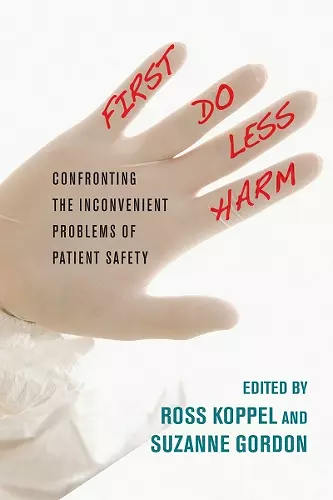First, Do Less Harm
Confronting the Inconvenient Problems of Patient Safety
Suzanne Gordon editor Ross Koppel editor
Format:Hardback
Publisher:Cornell University Press
Published:15th May '12
Currently unavailable, and unfortunately no date known when it will be back

Each year, hospital-acquired infections, prescribing and treatment errors, lost documents and test reports, communication failures, and other problems have caused thousands of deaths in the United States, added millions of days to patients’ hospital stays, and cost Americans tens of billions of dollars. Despite (and sometimes because of) new medical information technology and numerous well-intentioned initiatives to address these problems, threats to patient safety remain and in some areas are on the rise.
In First, Do Less Harm, twelve health care professionals and researchers plus two former patients look at patient safety from a variety of perspectives, finding many of the proposed solutions to be inadequate or impractical. Several contributors to this book attribute the failure to confront patient safety concerns to the influence of the "market model" on medicine and emphasize the need for hospital-wide teamwork and greater involvement from frontline workers (from janitors and aides to nurses and physicians) in planning, implementing, and evaluating effective safety initiatives.
Several chapters in First, Do Less Harm focus on the critical role of interprofessional and occupational practice in patient safety. Rather than focusing on the usual suspects—physicians, safety champions, or high level management—these chapters expand the list of "stakeholders" and patient safety advocates to include nurses, patient care assistants, and other staff, as well as the health care unions that may represent them. First, Do Less Harm also highlights workplace issues that negatively affect safety: including sleeplessness, excessive workloads, outsourcing of hospital cleaning, and lack of teamwork between physicians and other health care staff. In two chapters, experts explain why the promise of health care information technology to fix safety problems remains unrealized, with examples that are at once humorous and frightening. A book that will be required reading for physicians, nurses, hospital administrators, public health officers, quality and risk managers, healthcare educators, economists, and policymakers, First, Do Less Harm concludes with a list of twenty-seven paradoxes and challenges facing everyone interested in making care safe for both patients and those who care for them.
"First, Do Less Harm does an excellent job of detailing major system and cultural barriers confronting patient safety. Its authors discuss the important issues that we all face as frontline providers trying to deliver the best health care we can." -- John Chuo, MD, MS, Children's Hospital of Philadelphia
"Despite a decade of effort to decrease medical mistakes, progress has been painfully slow and unintended consequences have been the rule, not the exception. Two of the most innovative, iconoclastic thinkers in healthcare—Ross Koppel and Suzanne Gordon—have produced a book that tells us why, and illuminates the way forward. Their book is dramatic, honest, infuriating, surprising, and ultimately hopeful. It is a welcome contribution to the safety field, and deserves to be widely read." -- Robert M. Wachter, MD, Professor and Associate Chairman, Dept. of Medicine, Chief, Division of Hospital Medicine, and Marc and Lynne Benioff Endowed Chair, University of California, San Francisco
"The question of why we are unable to make the delivery of medical care safer and better—when we know how to do it—is a critically important but often neglected piece of the conversation on health reform. Although one reason for this failure is no doubt due to economic incentives, another is related to the archaic culture of health care. The essays in this book describe a system that is piecemeal, uncoordinated, dysfunctional, and dangerous for patients—and that doesn't have to be that way." -- Mary Lehman MacDonald, Director, AFT Healthcare
ISBN: 9780801450778
Dimensions: unknown
Weight: 907g
304 pages